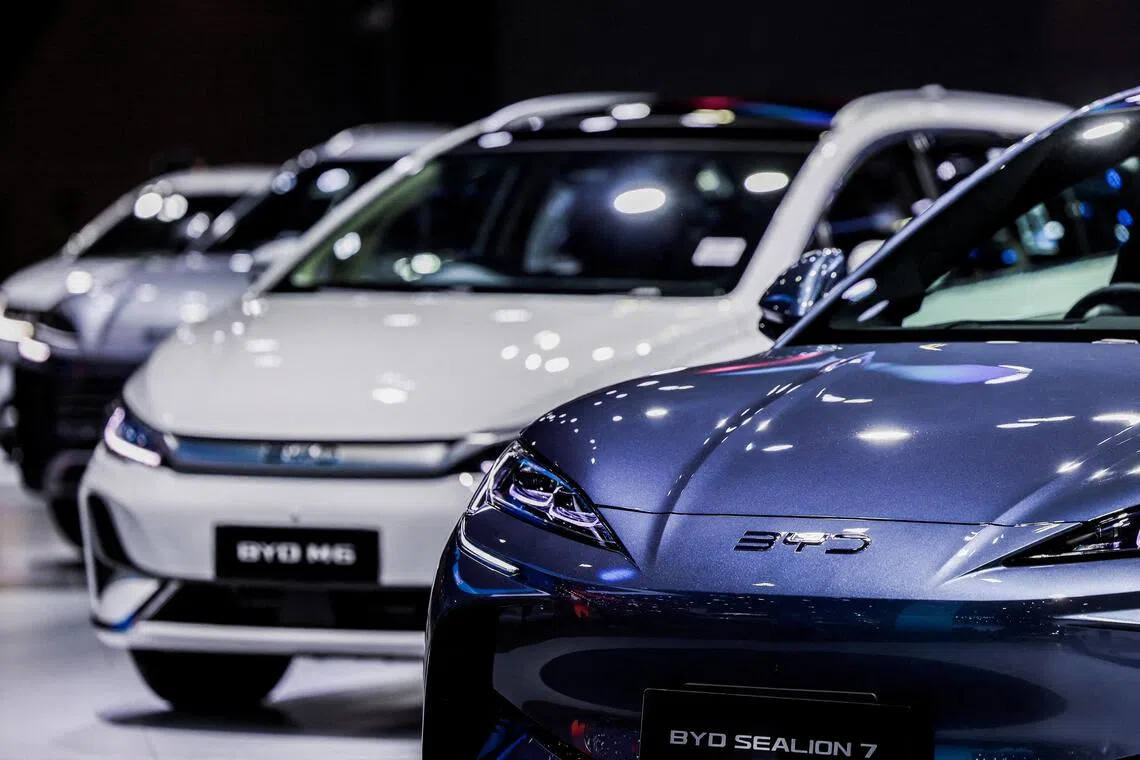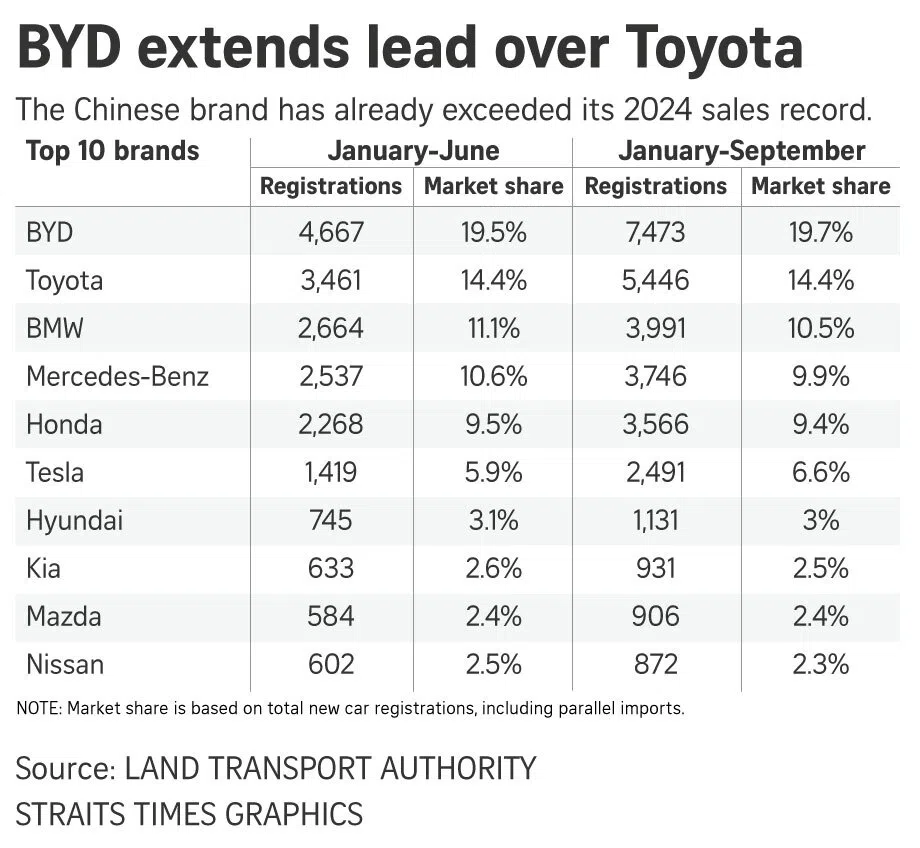BYD, the top-selling car brand in Singapore, widens lead over Toyota
Sign up now: Get ST's newsletters delivered to your inbox

BYD is poised to end 2025 with a sales record in Singapore as it extends its lead over Toyota.
PHOTO: REUTERS
Follow topic:
- BYD leads Singapore's car market in 2025 with 7,473 registrations, surpassing Toyota by 2,027 units. This exceeds BYD's total sales of 6,191 in 2024 and represents 19.7% of new car registrations.
- Toyota follows with 5,446 units (14.4%), with BMW and Mercedes-Benz also holding significant shares. BYD is the only Chinese brand in the top 10, while other Chinese brands collectively hold 9.3% of registrations.
- BYD aims for over 10,000 registrations in 2025. It has Category A COE EVs and leverages its wide distributor network. Toyota plans to offer more EVs in 2026, acknowledging evolving customer preferences.
AI generated
SINGAPORE – BYD, the top-selling car brand in Singapore, registered 7,473 cars here in the first nine months of 2025, extending its lead over Toyota.
The Chinese electric car brand trumped the Japanese carmaker’s registrations by 2,027 units between January and September, up from a margin of 1,203 at the mid-year mark.
While BYD’s sales in its Chinese home market have hit speed bumps recently, it will end 2025 with a record high in Singapore.
The 7,473 units it registered in Singapore so far in 2025 already exceed the 6,191 units it managed in 2024, and the brand has been posting nine consecutive months of sales growth. In September, it registered 1,006 units, up from 566 units in January.
Based on the latest Land Transport Authority (LTA) vehicle registration data published on Oct 24, BYD’s cars formed 19.7 per cent of total new car registrations in the first nine months of 2025. This is up from 19.5 per cent as at June
Second-placed Toyota put 5,446 units on the road in the same period, or 14.4 per cent of total new car registrations. This number includes cars from Lexus, the Japanese carmaker’s luxury arm.
Currently, the majority of Toyota models are petrol-hybrids, with a handful of conventional petrol models, along with a single electric model – a premium Lexus sport utility vehicle (SUV).
BMW, with 3,991 units, commands the third-largest market share, at 10.5 per cent of registrations.
Mercedes-Benz, which holds 9.9 per cent of the market, follows closely behind, with 3,746 units.
The top four brands together make up about 54.5 per cent of all new car registrations, with the remaining shared among 49 brands.
Honda – with 3,566 units, or 9.4 per cent – rounds up the five best-selling car brands in Singapore.
BYD is the only Chinese brand in the top 10.
Among the other 15 Chinese car brands in Singapore, GAC is in 11th place, MG in 12th and Xpeng in 13th position.
Collectively, the other Chinese car brands – BYD excluded – put 3,511 cars on the road in the first nine months of 2025, forming 9.3 per cent of total registrations.
Mr James Ng, managing director of BYD Singapore and the Philippines, said the company is working towards ending 2025 with more than 10,000 registrations in Singapore.
He expects the brand to continue growing in 2026 as electric vehicles (EVs) gain greater acceptance here, supported by government initiatives to encourage adoption.
Mr Ng Khee Siong, managing director of Borneo Motors Singapore, the distributor of Toyota, told The Straits Times that the registration figures “reflect evolving customer preferences across brands and powertrains, which we take into account as we continue to refine and expand our line-up to meet diverse mobility needs”.
Powertrains refer to the main parts that move a car, which can be petrol engines or electric motors.
Mr Ng added that Borneo Motors will introduce a wider range of electric vehicles in 2026, as well as expand its range of petrol-hybrid models, aligning with Toyota’s global direction.

In Singapore, BYD has been frequently introducing new models, spurring consumer interest. These include the Sealion 7, an electric SUV launched in January that industry insiders said has recorded strong sales.
The company has also appeared to be responsive to market needs. In 2023, it was among the first to introduce a tuned-down version of an existing EV
BYD launched a Category A version of its Sealion 7 in September.
It now offers eight of its nine models as Category A COE EVs.
Other Chinese car brands have since followed suit and are offering less powerful Category A versions of their EVs.
In October, LTA cited the availability of cheaper EVs, especially from China, as a driver behind the strong demand for COEs.
Unlike the majority of car brands in Singapore, which sell their products through a single dealer, BYD’s authorised distributor, Vantage Automotive, has four dealers.
This has enabled the carmaker to have 10 BYD-branded showrooms across Singapore, instead of one or two, as with most brands.
Associate Professor Walter Theseira, a transport economist at the Singapore University of Social Sciences, said BYD has an edge over other Chinese carmakers in Singapore because of its wider range of models and international reputation.
It also offers better value than Japanese or South Korean mass-market brands as BYD cars have more features, including connectivity capabilities that allow the driver to access the car’s functions remotely using a smartphone app, said Prof Theseira.
BYD’s performance in Singapore comes at a time when the brand is facing intensifying competition in its home market. In September, it posted its first year-on-year fall in total sales in China since 2020.
Citing sources, news agency Reuters reported in September that BYD had cut its 2025 sales target
The carmaker is looking to deliver between 800,000 and one million cars outside of China in 2025, or about a fifth of its total volume.
In 2024, it exported 417,204 EVs, or roughly 10 per cent of its global sales of 4.25 million passenger cars.
When asked to comment on BYD’s sales performance globally, Mr James Ng would say only that the company’s established production bases and sales network in key markets such as Singapore give it “broad global market presence”.


